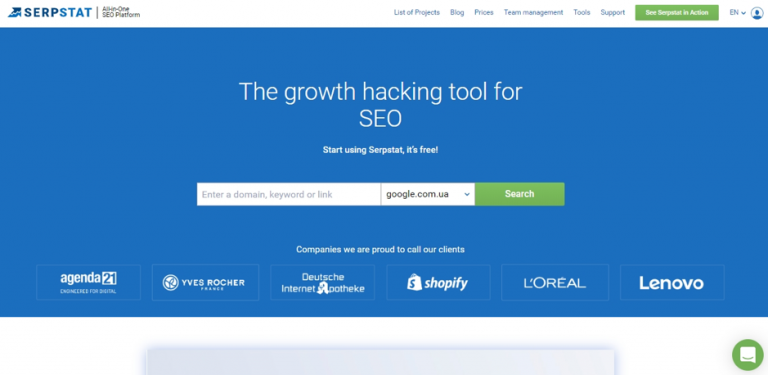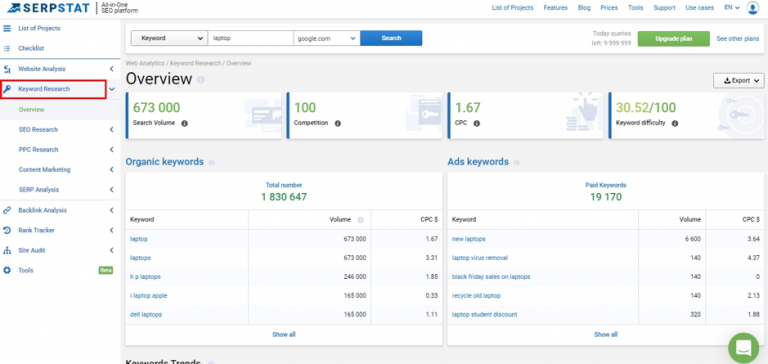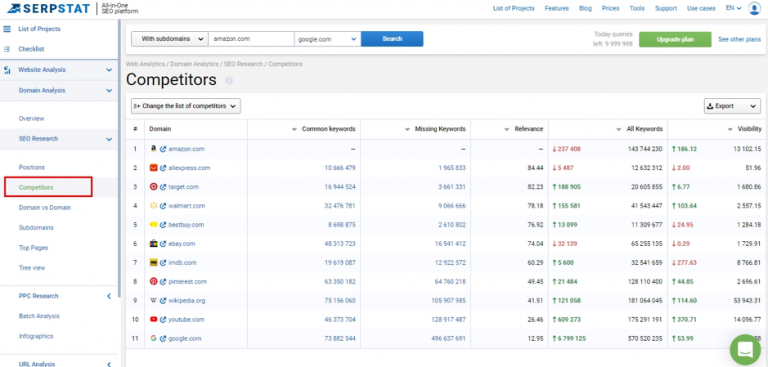Serpstat Review: How Does This SEO Tool Stand Up?
By: Jeff Bullas

Digital marketing teams are stuck together by the glue of their growing number of tools.
From social media management to influencer marketing, SEO, and beyond, there is a tool for everything.
But if you’re anything like me, every now and then you like to do an audit of your toolset…
Maybe there is a better or more affordable tool on the market that you need to know about?
When it comes to SEO research tools, most agencies and growing marketing teams rely on SEMrush and ahrefs.
While both tools are incredibly useful and robust, there has been a growing number of SEO’s turning to newer and alternative tools to help them capitalize on their search marketing efforts. Predominantly because new entrants in this market are offering similar functionality at a more affordable price.
One of these tools is Serpstat, an all-in-one SEO tool.
This tool is one of the newest on the market and is quickly gaining users across the community thanks to key features, such as its powerful API and a huge database of keywords and domains.
Recently, I had the privilege of taking this tool for a test drive, and in the rest of this article, I’ll share my Serpstat review.
Getting to Know Serpstat
With a range of features, it goes without saying that the Serpstat platform is remarkably comprehensive and easy to use.
Serpstat really surprises with the size of its database. They became the first tool that gathered the bases of all existing Google regions. This spreads across 230 countries and more than 4.2 billion keywords.
If you’re based in the US or wish to conduct keyword research on this market, the tool boasts over 2.5 billion keywords for this country alone.
With the help of Serpstat, you can also analyze PPC rankings. It stores more than 200 million ads of competitors in its database for you to analyze and compare with your own.
Serpstat’s core features are:
- Keyword Research
- Backlink analysis
- Rank Tracker
- Competitor research
- Site audit
- Keyword Clustering and Text Analysis
- API integration
Taking a look at keyword research
As I’ve already mentioned, Serpstat has a powerful database of keywords for you to explore and analyze.
The Serpstat team has also collected all the necessary tools for keyword analysis in one place. Here are a few of the features that will ramp up your keyword efforts:
- Related Keywords– This can help you expand your keywords list with semantically connected keywords.
- Search Suggestions and Questions– This can help you understand what your target audience is looking for and also expand your keywords list.
- Top Pages– This highlights which sites are currently ranking for selected keywords so that you can analyze and plan for which keywords you should be optimizing your site for.
- Missing Keywords– This highlights competitor pages that rank highly (within the top 10) but miss important keywords. This feature of Serpstat alone could be very useful and lucrative in tough and competitive verticals.
- Keyword Difficulty– As it sounds, this feature gives you an idea of how difficult the given keyword is to rank for. The team at Serpstat developed their own algorithm for determining keyword difficulty, and from what I have seen it is the most accurate among SEO tools.
- Keyword Research Filters– At the top of the results page, you can filter keywords by a range of different targeting filters which you can customize yourself.
- Keyword Clustering– With Serpstat, you can group keywords by topic, intent, and implication. This will help you understand the user intent behind keyword phrases and ensure your website attracts the right type of traffic.
- Text Analytics– One more unique and very useful function of Serpstat’s keyword research tool is content analysis. You can analyze the text content of both your own site and that of your competitors. This feature helps you optimize the content on your website to rank for whole clusters of keywords, instead of just single phrases.
Using Serpstat for Competitor Research
One of the great features of Serpstat is that you are able to conduct competitor research at so many different levels.
Keeping track of your top 100 competitors, the tool keeps a very handy list of common keywords, as well as those that are missing, so that you can then compare them against your own website.
With a Domain vs. Domain comparison functionality, you’re also able to analyze what both you and your competitors are ranking for, and view information such as search volume, cost-per-click, and competition for each keyword.
Being able to compare your site against competitors is incredibly useful, and both features are well designed and easy to use.
You can find pages from your competitors’ websites with the highest traffic, learn from their keyword optimization, and act accordingly.
Another plus is that you’re able to conduct a batch analysis of up to 200 domains and compare a wealth of parameters such as visibility, traffic, backlinks, and keywords. You can even follow the backlinks of your competitors, to identify new opportunities based on their activity. With Serpstat’s backlink analysis, you can find information about referring domains, unique backlink history, new and lost backlinks, anchors and a map of linking domains.
All of this competitor data is extremely useful in determining your SEO strategy moving forward.
Conducting a Site Audit with Serpstat
A cool feature of Serpstat is their Domain Optimization Score.
This report analyzes a website and identifies important errors that may be negatively impacting your SEO performance
Here are the categories of errors this feature can discover:
- HTTP Status Code
- Meta Tags and Headings
- Accessibility and Indexation
- Links and Redirects
- Server Parameters
- Loading Speed
The findings of this site analysis will help you improve the technical performance of your website and increase your rankings.
Ongoing Site and Competitor Tracking
Serpstat has robust visibility and tracking features that allow webmasters to have a clear understanding of their sites’ rankings and competitive performance. One of these features is called Rank Tracker.
Recently their development team released Rank Tracker 2.0. The updated version has a variety of unique features and provides advanced ways to monitor a site’s rankings in organic and paid search results. The new version of the tool simultaneously tracks your top 100 competitors according to their positions, visibility, and traffic. Plus, it can track up to 50,000 keywords simultaneously!
Why You Should Consider Serpstat
I can say without a doubt that Serpstat is one of the best SEO tools on the market for agencies and growing in-house SEO teams.
Their features rival some of the better-known SEO tools, yet their pricing is much more affordable.
You can have up to five users from just $299 per month, which means it’s great for small agencies and in-house teams when compared with some of the other more fancied players in the market.
The Customer Team at Serpstat also have a great reputation for attending to customer questions promptly and finding a solution within hours. They are extremely focused on customer success and everything they do aligns with this focus.
They also have an amazing (free) learning center with information about keyword research, competitor analysis, and SEO improvements
For growing companies and agencies looking to save money on their overheads, or invest in new tools, Serpstat should be on the top of the shopping list.
















